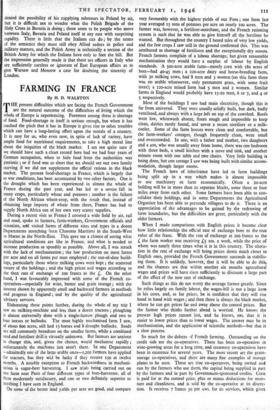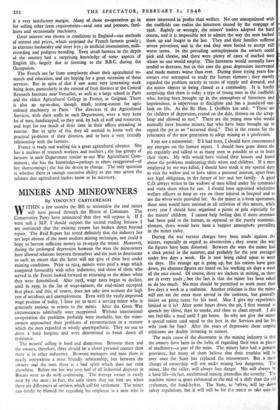FARMING IN FRANCE
By H. D. WALSTON
THE present difficulties which are facing the French Government are the natural outcome of the difficulties of living which the whole of Europe is experiencing. Foremost among these is shortage of food. Food-shortage in itself is serious enough, but when it has reached the pitch that it has in Europe it gives rise to other troubles which can have a long-lasting effect upon the morale of a country. It is easy for us, who even now, in spite of lack of variety, have ample food for nutritional requirements, to take a high moral line about the iniquities of the black market. I am not quite sure if we should have such a clean record here had we had four years of German occupation, when to hide food from the authorities was patriotic ; or if food was so short that we should see our own family starving if we did not supplement the official rations in the black market. The present food-shortage in France, which is largely due to war conditions, has been accentuated by two other factors. One is the drought which has been experienced in almost the whole of France during the past year, and has led to a severe fall in many crops, particularly wheat and potatoes ; another is the failure of the North African wheat-crop, with the result that, instead of obtaining large imports of wheat from there, France has had to supply North Africa out of her own very scanty supplies.
During a recent visit to France I covered a wide field by air, rail and road, spoke to farmers, farm-workers, Government officials and scientists, anti visited farms of different sizes and types in a dozen Departments stretching from Charente Maritime in the South-West to Marne in the North-East. This gave me a chance of seeing what agricultural conditions are like in France, and what is needed to increase production as speedily as possible. Above all, I was struck with the lack of mechanisation ; the low production on most farms per acre and on all farms per man employed ; the out-of-date build- ings, particularly those where milking cows were kept ; the scattered nature of the holdings ; and the high prices and wages according to the then rate of exchange of 200 francs to the £. On the other hand, I was favourably impressed with some of the French co- operatives—especially for wine, butter and grain storage ; with the interest shown by apparently small and backward farmers in methods and progress in England ; and by the quality of the agricultural advisory services.
Elaborating these points further, during the whole of my trip I saw no milking-machine and less than a dozen tractors ; ploughing is almost universally done with a single-furrow plough and two to four horses or bullocks. The most highly mechanised farm I saw, of about 600 acres, still had 13 horses and 8 draught bullocks. Seeds are still commonly broadcast on the smaller farms, while a combined seed and feruliser drill is virtually unknown. But farmers are anxious to change this, and, given the chance, would mechanise rapidly ; unfortunately the machines just aren't there. In one Department --admittedly one of the large arable ones-1,20o farmers have applied for tractors, but they wia be lucky if they receive 150 in twelve months. A notable exception to French backwardness in mechani- sation is sugar-beet harvesting. I saw trials being carried out on one farm near Paris of four different types of beet-harvester, all of them moderately satisfactory, and one or two definitely superior to anything I have seen in England.
On some of the better land yields per acre are good, and compare very favourably with the highest yields of our Fens ; one farm last year averaged 15 tons of potatoes per acre on nearly too acres. The farmer was, however, a fertiliser-merchant, and the French rationing system is such that he was able to give himself all the fertiliser he wanted. But throughout the country I heard tales of very low yields, and the few crops I saw still in the ground confirmed this. This was attributed to shortage of fertilisers and the exceptionally dry season. French farmers complain of a labour shortage, but given reasonable mechanisation they would have a surplus of labour by English standards. A 500-acre arable farm—mostly corn with 180 acres of beet—had 40-45 men ; a 220-acre dairy and horse-breeding 'farm, with 3o milking cows, had 8 men and 3 women (on this farm there was no arable whatsoever, only permanent grass, with some fruit trees); a 120-acre mixed farm had 5 men and 2 women. Similar farms in England would probably have 15-20 men, 6 or 7, and 4 or 5 respectively.
Most of the buildings I saw had main electricity, though this is far from universal. They were usually solidly built, but dark, badly ventilated, and always with a large loft on top of the cowshed. Roofs were low, whitewash absent, floors rough and impossible to keep clean, dairies rarely found, and never a steam steriliser or a milk- cooler. Some of the farm houses were clean and comfortable, but the farm-workers' cottages, though frequently clean, were small and overcrowded. In one, with a father and mother, two daughters and a son, who was usually away from home, there was one bedroom with three beds, a small kitchen with a stove and sink, and another minute room with one table and two chairs. Very little building is being done, but one cottage I saw was being built with similar accom- modation, though larger rooms.
The French laws of inheritance have led to farm buildings being split up in a way which makes it almost impossible to use machinery or farm economically. Often a 20-acre holding will be in more than 20 separate blocks, some three or four miles away from each other. Some farmers have been able to con- solidate their holdings, and in some Departments the Agricultural Organiser has been able to persuade villagers to do it. There is an appreciation of the advantages to be gained by the redrawing of farm boundaries, but the difficulties are great, particularly with the older farmers.
When I made comparisons with English prices it became clear how little relationship the official rate of exchange bore to the true value of the franc. With the rate of exchange at 200 francs to the £ the farm worker was receiving Ls Jos. a week, while the price of wheat was nearly three times what it is in this country. The altera- tion in the rate of exchange will bring prices down much closer to English ones, provided the French Government succeeds in stabilis- ing them. It is unlikely, however, that it will be able to do this, and the chances are that within another six months agricultural wages and prices will have risen sufficiently to discount a large part of the effect of the new rate of exchange.
Such things as this do not worry the average farmer greatly. Since he relies largely on family labour, the wages-bill is not a large item in his costs, and, as for prices, he is confident that they will rise hand in hand with wages ; and then there is always the black market, where he can get prices far and away above the control prices. But the farmer who thinks further ahead is worried. He knows the present high prices cannot last, and he knows, too, that it is easier to lower prices than to lower wages. The answer may be in mechanisation, and the application of scientific methods—but that is a slow process.
So much for the defects ,)f French farming. Outstanding on the credit side are the co-operatives. There has been co-operation in wine-growing areas for a long time, and creamery co-operatives have been in existence for several years. The most recent are the grain- storage co-operatives, and there are many fine examples of storage plants to be seen. These are true co-operatives, being owned and run by the farmers who use them, the capital being supplied in part by the farmers and in part by Government-sponsored credits. Corn is paid for at the control price, plus or minus deductions for mois- ture and cleanliness, and is sold by the co-operative at its discre- tion. It receives 7 francs 5o per cwt. for its services, which gives
it a very satisfactory margin. Many of those co-operatives go in for selling other farm requirements—seed corn and potatoes, ferti- lisers and occasionally machinery.
Great interest was shown in conditions in England—our methods of control and prices, which surprised the French farmers greatly ; in alternate husbandry and short leys ; in artificial insemination, milk- recording and pedigree breeding. Even small farmers in the depth of the country had a surprising knowledge of some aspects of English life, largely due to listening to the B.B.C. during the Occupation.
The French are far from complacent about their agricultural re- search and education, and are hoping for a great extension of these services. But in spite of that I saw some very interesting work being done, particularly in the control of fruit diseases at the Central Research Institute near Versailles, as well as a large school in Paris and the oldest Agricultural College in France, at Grignon. There is also an up-to-date, though small, testing-station for agri- cultural machinery in Paris. The directors of the Agricultural Services, with their staffs in each Department, were a very keen lot of men, handicapped, so they said, by lack of staff and resources, and kept for too much of their time in their offices attending' to routine. But in spite of this they all seemed to know well the practical problems of their districts, and to have a very friendly relationship with the farmers.
France is ready and waiting for a great agricultural advance. She has a nucleus of research workers and teachers ; she has groups of farmers in each Department similar to our War Agricultural Com- mittees ; she has the knowledge—perhaps at times exaggerated—of her shortcomings ; she has the desire to change. The only question is whether there is enough executive ability to put into action the reforms that agricultural leaders know to be necessary.



























 Previous page
Previous page